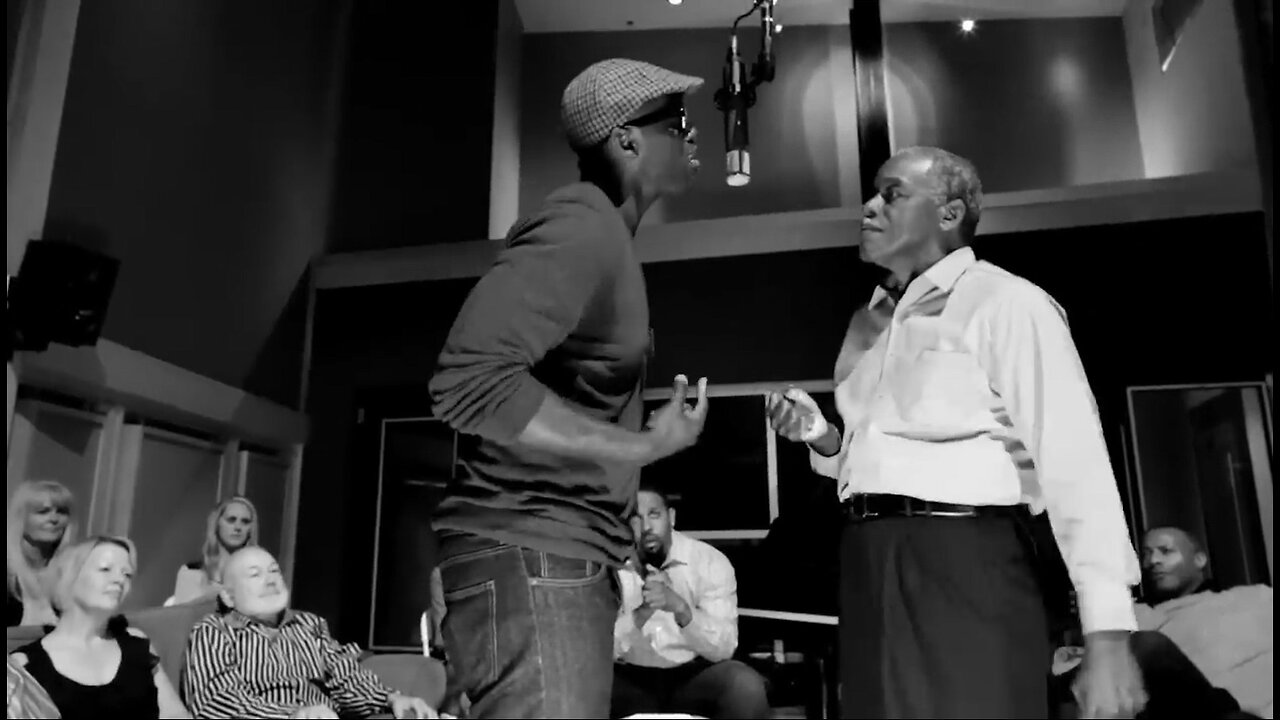Premium Only Content

Brian and Thomas Owens with a cover of SAM COOKE's song, "A CHANGE IS GONNA COME".
So, here we have a sharp de-escalation of the last three weeks of ultra heavy Progressive and Alternative Rock music I have been featuring on my channel. This, could be said to be in expectation of what is soon to come here on Afrikitty..... (^_^)
Brian Owens and his father, Thomas Owens, share the gift of music across generations in this cover of Sam Cooke's classic, "A Change is Gonna Come," in front of a studio audience at Shock City Studios in St. Louis, MO.
Just a mention of note here -- please note the fabulous Hammond Organ doing its thing all the way through this song. Aaaahhh *sigh*
Samuel Cooke (January 22, 1931 – December 11, 1964), known professionally as Sam Cooke, was an American singer and songwriter. Considered one of the most influential soul artists of all time, Cooke is commonly referred to as the "King of Soul" for his distinctive vocals, pioneering contributions to the genre, and significance in popular music. During his eight-year career, Cooke released 29 singles that charted in the Top 40 of the Billboard Pop Singles chart, as well as 20 singles in the Top Ten of Billboard's Black Singles chart. In 1964, he was shot and killed by the manager of a motel in Los Angeles. After an inquest and investigation, the courts ruled Cooke's death to be a justifiable homicide. His family has since questioned the circumstances of his death. Cooke is included on Billboard's 2015 list of the 35 greatest R&B artists of all time.
Early life
Sam Cooke was born Samuel Cook in Clarksdale, Mississippi, in 1931 (he added the "e" to his last name in 1957 to signify a new start to his life). He was the fifth of eight children of Rev. Charles Cook, a Baptist minister in the Church of Christ (Holiness), and the former Annie Mae Carroll. One of his younger brothers, L.C. (1932–2017), later became a member of the doo-wop band Johnny Keyes and the Magnificents. Cooke was raised Baptist.
Cooke's family moved to Chicago in 1933. There, he attended Doolittle Elementary and Wendell Phillips Academy High School, the same school that Nat King Cole had attended a few years earlier. Cooke sang in the choir of his father's church and began his career with his siblings in a group called the Singing Children when he was six years old. Cooke first became known as lead singer with the Highway Q.C.'s when he was a teenager, having joined the group at the age of 14. During this time, Cooke befriended fellow gospel singer and neighbor Lou Rawls, who sang in a rival gospel group.
Career
The Soul Stirrers
Main article: The Soul Stirrers
In 1950, Cooke replaced gospel tenor R. H. Harris as lead singer of his gospel group The Soul Stirrers, who had signed with Specialty Records on behalf of the group. Their first recording under Cooke's leadership was the song "Jesus Gave Me Water" in 1950. They also recorded the gospel songs "Peace in the Valley", "How Far Am I from Canaan?", "Jesus Paid the Debt" and "One More River", among many others, some of which he wrote. Cooke was often credited for bringing gospel music to the attention of a younger crowd of listeners, mainly girls who would rush to the stage when the Soul Stirrers hit the stage just to get a glimpse of him.
Crossover pop success
Cooke had 30 U.S. top 40 hits between 1957 and 1964, plus three more posthumously. Major hits like "You Send Me", "A Change Is Gonna Come", "Cupid", "Chain Gang", "Wonderful World", "Another Saturday Night", and "Twistin' the Night Away" are some of his most popular songs. Twistin' the Night Away was one of Cooke's biggest selling albums. He was also among the first modern Black performers and composers to attend to the business side of his musical career. Cooke founded both a record label and a publishing company as an extension of his careers as a singer and composer. Cooke also took an active part in the Civil Rights Movement.
Cooke in Billboard, 1965, released posthumously
Cooke's first pop/soul single was "Lovable" (1956), a remake of the gospel song "Wonderful". It was released under the alias "Dale Cook" in order not to alienate his gospel fan base; there was a considerable stigma against gospel singers performing secular music. However, it fooled no one — his unique and distinctive vocals were easily recognized. Art Rupe, head of Specialty Records, the label of the Soul Stirrers, gave his blessing for Cooke to record secular music under his real name, but he was unhappy about the type of music Cooke and producer Bumps Blackwell were making. Rupe expected Cooke's secular music to be similar to that of another Specialty Records artist, Little Richard. When Rupe walked in on a recording session and heard Cooke singing Gershwin, he was quite upset. After an argument between Rupe and Blackwell, Cooke and Blackwell left the label.
"Lovable" was neither a hit nor a flop, and indicated Cooke's future potential. While gospel was popular, Cooke saw that fans were mostly limited to low-income, rural parts of the country, and sought to branch out. Cooke later admitted that he got an endorsement for a career in pop music from the least likely man, his pastor father. Cooke stated: "My father told me it was not what I sang that was important, but that God gave me a voice and musical talent and the true use of His gift was to share it and make people happy." Taking the name "Sam Cooke", he sought a fresh start in pop.
In 1957, Cooke appeared on ABC's The Guy Mitchell Show. That same year, he signed with Keen Records. Cooke's first hit, "You Send Me", released as the B-side of "Summertime", spent six weeks at No. 1 on the Billboard R&B chart. The song also had mainstream success, spending three weeks at No. 1 on the Billboard pop chart. It elevated him from earning $200 a week to over $5,000 a week.
In 1958, Cooke performed for the famed Cavalcade of Jazz concert produced by Leon Hefflin held at the Shrine Auditorium on August 3. The other headliners were Little Willie John, Ray Charles, Ernie Freeman, and Bo Rhambo. Sammy Davis Jr. was there to crown the winner of the Miss Cavalcade of Jazz beauty contest. The event featured the top four prominent disc jockeys of Los Angeles.
Billboard advertisement, May 29, 1961
Cooke signed with the RCA Victor record label in January 1960, having been offered a guaranteed $100,000 (equivalent to $1,030,000 in 2023) by the label's producers Hugo & Luigi. One of his first RCA Victor singles was "Chain Gang", which reached No. 2 on the Billboard pop chart. It was followed by more hits, including "Sad Mood", "Cupid", "Bring It On Home to Me" (with Lou Rawls on backing vocals), "Another Saturday Night",[38] and "Twistin' the Night Away".
In 1961, Cooke started his own record label, SAR Records, with J. W. Alexander and his manager, Roy Crain. The label soon included the Simms Twins, the Valentinos (who were Bobby Womack and his brothers), Mel Carter and Johnnie Taylor. Cooke then created a publishing imprint and management firm named Kags.
Like most R&B artists of his time, Cooke focused on singles; in all, he had 29 top 40 hits on the pop charts and more on the R&B charts. Cooke was a prolific songwriter and wrote most of the songs he recorded. Cooke also had a hand in overseeing some of the song arrangements. In spite of releasing mostly singles, he released a well-received blues-inflected LP in 1963, Night Beat, and his most critically acclaimed studio album, Ain't That Good News, which featured five singles, in 1964.
In 1963, Cooke signed a five-year contract for Allen Klein to manage Kags Music and SAR Records and made him his manager. Klein negotiated a five-year deal (three years plus two option years) with RCA Victor in which a holding company, Tracey, Ltd, named after Cooke's daughter, owned by Klein and managed by J. W. Alexander, would produce and own Cooke's recordings. RCA Victor would get exclusive distribution rights in exchange for six percent royalty payments and payments for the recording sessions. For tax reasons, Cooke would receive preferred stock in Tracey instead of an initial cash advance of $100,000. He would receive cash advances of $100,000 for the next two years, followed by an additional $75,000 for each of the two option years if the deal went to term.
Vocal ability
Cooke is widely considered one of the greatest singers and most accomplished vocalists of all time. His incredibly pure tenor voice was big, velvety and expansive, with an instantly recognizable tone. Cooke's pitch was remarkable, and his manner of singing was effortlessly soulful. Cooke could go as high as high C without losing purity or volume, and his upper mid-range was coated in a unique rasp. Cooke's vocal style was very adaptable, adopting a rather classical sound on jazz and pop songs while maintaining his trademark stylistic soulful hold on R&B, gospel and soul music.
Cooke's delivery encompassed a wide range of emotions including playful expressiveness to interact with listeners, mellow somberness as a form of reflection, and (in "A Change Is Gonna Come") profound soulfulness. When performing live, he would often play with notes and scales and experiment with melodies and his enunciation, while improvising entire songs. Cooke also began to perform highly charged versions of his songs later in his career.
Cooke's vocal exploits would go on to influence many acts like Otis Redding, James Brown, Rod Stewart, Johnny Nash, Tina Turner, Wilson Pickett, Mick Jagger, Al Green, Paul McCartney, Diana Ross, Marvin Gaye, Steve Perry, and Stevie Wonder among many others.
Personal life
Cooke was married twice. His first marriage was to singer-dancer Dolores Elizabeth Milligan Cooke, who took the stage name "Dee Dee Mohawk" in 1953; they divorced in 1958. She was killed in an auto collision in Fresno, California, in 1959. Although Cooke and Dolores were divorced, he paid for his ex-wife's funeral expenses.
In 1958, Cooke married his second wife, Barbara Campbell (1935–2021), in Chicago. His father performed the ceremony. They had three children: Linda (b. 1953), Tracy (b. 1960), and Vincent (1961–1963), who drowned in the family swimming pool. Cooke also fathered at least three other children out of wedlock. In 1958, a woman in Philadelphia, Connie Bolling, claimed Cooke was the father of her son. Cooke paid her an estimated $5,000 settlement out of court.
In November 1958, Cooke was involved in a car accident en route from St. Louis to Greenville, Mississippi. His chauffeur Edward Cunningham was killed, while Cooke, guitarist Cliff White, and singer Lou Rawls were hospitalized.
Cooke was a central part of the civil rights movement, using his influence and popularity with the White and Black populations to fight for the cause. Cooke was friends with boxer Muhammad Ali, activist Malcolm X and football player Jim Brown, who together campaigned for racial equality.
For more information on Sam Cooke, please go to his Wikipedia page at https://en.wikipedia.org/wiki/Sam_Cooke
-
 LIVE
LIVE
megimu32
3 hours agoON THE SUBJECT: IRL Streamers Attacked & Nostalgic Animal Movies That Made Us Cry
507 watching -
 1:00:54
1:00:54
The Tom Renz Show
7 hours agoMore Epstein/FBI, a Scary Trade War, & the Dem Echo Chamber
7.49K1 -
 40:43
40:43
Kimberly Guilfoyle
8 hours agoDems Double Down on Delusion-Why? Live with Tony Kinnett & Bo French | Ep.202
77.8K34 -
 1:28:42
1:28:42
Redacted News
6 hours agoBREAKING! SOMETHING BIG IS HAPPENING IN EUROPE ALL OUT WAR IS COMING AGAINST RUSSIA, TRUMP FURIOUS
121K282 -
 47:50
47:50
Candace Show Podcast
6 hours agoBREAKING: Judge Makes Statement Regarding Taylor Swift's Text Messages. | Candace Ep 155
113K113 -
 1:14:23
1:14:23
Josh Pate's College Football Show
3 hours ago $0.29 earnedCFB’s Most Hated Teams | FSU & Clemson Future | Big Ten Win Totals | Star Rankings Overrated?
14.5K -
 1:33:47
1:33:47
CatfishedOnline
5 hours agoGoing Live With Robert - Weekly Recap
27.8K -
 55:18
55:18
LFA TV
1 day agoEurope’s Sudden Turn Against America | TRUMPET DAILY 3.6.25 7PM
32.2K3 -
 4:21
4:21
Tundra Tactical
4 hours ago $2.12 earnedPam Bondi MUST Enforce Due Process NOW!
23.7K1 -
 56:42
56:42
VSiNLive
5 hours agoFollow the Money with Mitch Moss & Pauly Howard | Hour 1
48K1